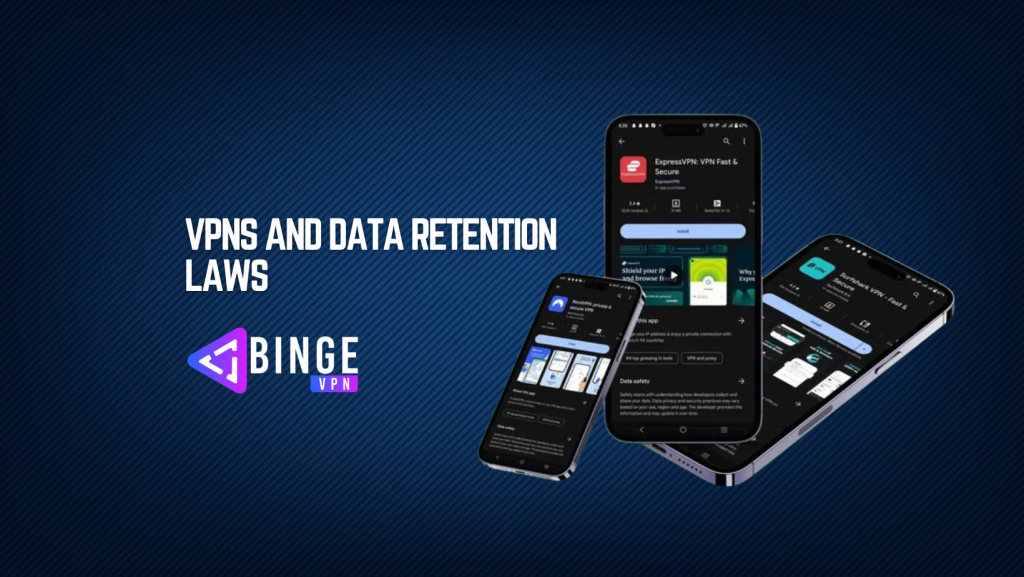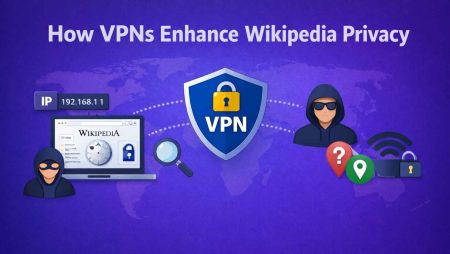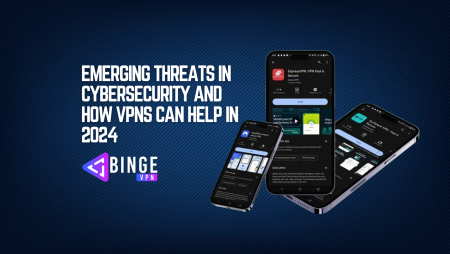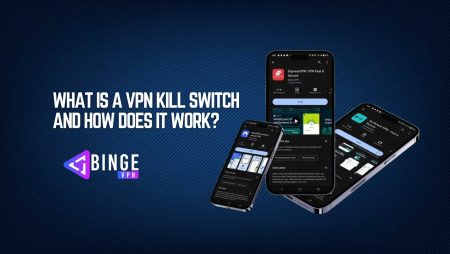In an era where privacy concerns are growing, and governments and corporations alike are increasingly interested in tracking digital behavior, the role of Virtual Private Networks (VPNs) has become more crucial than ever. One of the most significant issues affecting internet privacy today is data retention laws. These laws require internet service providers (ISPs) and, in some cases, VPN providers to store information about users’ online activities for a specified period. This information may later be accessed by law enforcement or government agencies.
For individuals seeking to protect their privacy, understanding the implications of data retention laws and how VPNs play into this landscape is essential. This blog will break down what data retention laws are, how they vary across different regions, and how using a VPN can either protect or potentially expose your online data. By the end, you’ll have a clearer understanding of how VPNs interact with data retention laws and what you need to be aware of when selecting a VPN provider.
What Are Data Retention Laws?
Data retention laws require ISPs, telecommunications companies, and sometimes even VPN providers to collect and store data on users’ online activities. The data collected can include:
- Connection logs: These show when and for how long you were online.
- Traffic data: This includes the websites you visited, the emails you sent, and other forms of communication.
- IP addresses: Both your original IP address and the IP addresses of the websites or services you accessed.
The length of time this data is stored can vary, typically ranging from six months to two years. These laws are often justified on the grounds of national security or criminal investigations, giving law enforcement access to vital information when needed.
Global Overview of Data Retention Laws
Data retention laws vary significantly around the world, with some regions enforcing strict regulations, while others have more lenient or nonexistent policies. Here’s a look at how different countries handle data retention:
1. European Union
The EU passed the Data Retention Directive in 2006, which required ISPs and telecommunications providers to store user data for up to two years. However, this directive was invalidated by the European Court of Justice in 2014 due to privacy concerns. Despite this, many EU member states have retained similar laws at a national level. Countries like Germany, the UK, and France still enforce data retention regulations.
2. United States
The US does not have a federal data retention law for ISPs, but various agencies can request data under laws like the Patriot Act. Additionally, companies often store user data voluntarily or due to industry regulations. Some states may have their own data retention policies, but ISPs and tech companies often keep user logs for an indeterminate amount of time.
3. Australia
Australia has some of the strictest data retention laws. The Telecommunications (Interception and Access) Amendment (Data Retention) Act 2015 requires ISPs to store metadata for two years. This includes information about communication, such as call times, durations, IP addresses, and more, but not the content of the communications.
4. Russia and China
Both Russia and China have stringent data retention and internet monitoring laws. Russia’s Yarovaya Law requires ISPs to store all metadata for up to three years and the content of communications for six months. China’s government enforces laws that require service providers to collect and store a wide range of user data, and VPN services operating within the country must comply with these laws.
5. Other Regions
Countries like Canada, New Zealand, and Brazil have data retention laws, though they may not be as far-reaching as in the EU or Australia. However, the trends suggest that more countries are adopting data retention policies over time.
How VPNs Can Help Protect Your Privacy
VPNs are popular tools for protecting online privacy by encrypting your internet connection and hiding your IP address. When you connect to a VPN server, your internet traffic is routed through an encrypted tunnel, making it nearly impossible for anyone—ISPs, hackers, or even government agencies—to monitor your activities.
Here’s how VPNs offer privacy protection:
1. Encryption
VPNs encrypt your internet traffic, preventing ISPs and others from seeing what you’re doing online. Even if they are required to store data, all they will see is encrypted traffic, which is virtually unreadable without the decryption key.
2. IP Address Masking
VPNs also hide your real IP address by assigning you one from the server you are connected to. This makes it harder for websites, advertisers, or government agencies to track your location or identity.
3. No-Logs Policies
Many VPN providers promote their services as “no-logs,” meaning they do not keep records of your online activities. This is particularly important in regions where data retention laws apply, as a no-logs policy means there’s no data to hand over to authorities, even if requested.
However, not all VPN providers live up to their no-logs claims, which is why it’s important to choose a reputable provider.
VPNs and Data Retention: What to Watch Out For
While VPNs offer a layer of protection, they are not always immune to data retention laws. In some countries, VPN providers may be required to comply with these laws, which means they could be forced to log user data and hand it over to authorities upon request.
1. Jurisdiction Matters
The jurisdiction under which a VPN provider operates is crucial. VPNs based in countries with strict data retention laws may be obligated to store user data. For instance, VPNs headquartered in Australia or the UK may have to comply with local laws, even if they advertise a no-logs policy.
On the other hand, VPNs based in privacy-friendly regions like Panama, the British Virgin Islands, or Switzerland are less likely to be subject to mandatory data retention laws. This makes them more reliable choices for users concerned about privacy.
2. Reputable No-Logs Policies
Not all VPN providers claiming a no-logs policy are trustworthy. Some may keep minimal logs, such as connection timestamps, which could still be used to trace your activities. To ensure your privacy, choose a VPN provider that has undergone independent audits to verify their no-logs claims. Providers like ExpressVPN, NordVPN, and Surfshark have undergone such audits and are considered reliable.
3. Data Breaches
Even if a VPN provider does not log your activity, a data breach could expose sensitive information. Look for VPNs that use strong encryption protocols and have a solid track record of protecting user data. Additionally, some VPNs offer extra features like multi-hop connections (routing your traffic through multiple servers) and kill switches (which automatically disconnect your internet if the VPN connection drops) for added security.
How to Choose the Right VPN to Bypass Data Retention Laws
When choosing a VPN to protect against data retention, consider the following factors:
1. Jurisdiction
Opt for a VPN provider that operates in a privacy-friendly country, outside the jurisdiction of data retention laws. Popular choices include VPNs based in Panama (NordVPN), the British Virgin Islands (ExpressVPN), or Switzerland (ProtonVPN).
2. Independent Audits
Select a VPN provider that has undergone independent audits to verify its no-logs policy. This ensures that they do not keep records of your online activities.
3. Encryption Strength
Ensure the VPN uses strong encryption protocols like AES-256, which is considered the gold standard for data security.
4. Additional Privacy Features
Look for VPNs that offer advanced privacy features like multi-hop connections, kill switches, and DNS leak protection to further safeguard your data.
5. Reputation and Transparency
Choose a VPN provider with a good reputation and a history of protecting user privacy. Read user reviews and privacy policies to understand how seriously they take your security.
FAQs
What are data retention laws?
Data retention laws require ISPs and, in some cases, VPN providers to collect and store information about users’ online activities for a specified period, often for national security or criminal investigation purposes.
Do all VPNs keep logs?
No, many VPN providers offer a no-logs policy, meaning they don’t store information about your online activities. However, not all VPNs are trustworthy, so it’s essential to choose one that has undergone independent audits.
How do I choose a VPN that protects my privacy?
Choose a VPN provider based in a privacy-friendly jurisdiction, with a verified no-logs policy, strong encryption, and additional privacy features like multi-hop and a kill switch.
Conclusion
In a world where online privacy is constantly under threat, VPNs offer a powerful tool for protecting your personal data from prying eyes. However, it’s important to understand that VPNs are not a one-size-fits-all solution, especially in the context of data retention laws. The jurisdiction of your VPN provider, their no-logs policy, and their commitment to security all play a crucial role in determining how well your data is protected.
By carefully selecting a trustworthy VPN provider and being aware of the legal landscape in your region, you can significantly reduce your exposure to data retention laws and protect your online privacy.




